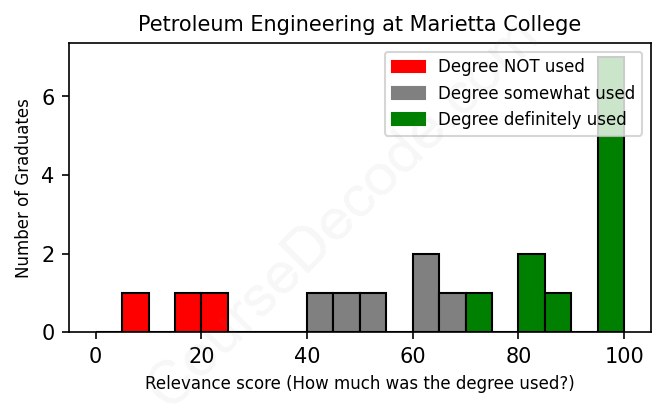
First, some facts. Of the Petroleum Engineering graduates from Marietta College we've analyzed , here's how many have used (or NOT used) their degree in their career:

These are estimates based on AI analysis of 20 LinkedIn profiles (see below).
The verdict? Slightly above average. Overall, with an average relevance score of 70%, Petroleum Engineering graduates from Marietta College have a slightly higher likelihood (+3%) of finding work in this field compared to the average graduate across all fields:
And for comparison, here's the chart for all profiles we've looked at across all degrees.
Also, after graduating, only 20% of these graduates have pursued further education other than another Bachelor's degree (such as a Masters degree or other), compared to the average across all profiles of 35%. This suggests a Bachelors degree is enough for most Petroleum Engineering graduates, and it's normal to look for work straight after graduation.
See the details:
|
Relevance score: 80% We think this person has gone into a career highly relevant to their degree. We think this person has gone into a career highly relevant to their degree.
DEGREE INFOGraduated in 2017 from Marietta College with a Bachelor of Science (BS) in Petroleum Engineering. No other secondary education since. JOB HISTORY SINCE GRADUATIONFoundation Engineer Hess Corporation Jul 2017 - Feb 2019 Facilities Engineering Project Lead  Hess Corporation Feb 2019 - Oct 2021 Operations Manager  Supernova Services Oct 2021 - Present ABOUTNo information provided. |
The top 10 most common jobs done by the graduates we've analyzed (ranked most common to least) are:
Looking at the career paths taken by graduates from Marietta College's Petroleum Engineering program, it's clear that many have pursued jobs that are intricately linked to petroleum engineering. Common positions include roles like Drilling Engineer, Completions Engineer, and various engineering roles at companies like Baker Hughes, Antero Resources, and ConocoPhillips. These positions typically require knowledge of drilling techniques, completion strategies, and working with oil and gas production equipment—definitely areas that tie back to what these graduates learned during their studies. So if you’re thinking about this major, you can see that there’s a strong connection between their degree and the jobs they’re landing.
However, not every graduate has jumped straight into roles that fully utilize their petroleum engineering skills. Some have gravitated toward positions like sales management, operations coordination, or even unrelated fields like coaching and teaching. These roles often only partially overlap with core engineering principles or require more of a general skill set than what the graduates honed in school. In summary, while a significant number of graduates remain in petroleum-related fields, a fair share have ventured into careers that don’t directly involve petroleum engineering, highlighting a mixed relevance in the overall job market for these graduates.
Here is a visual representation of the most common words in job titles for Petroleum Engineering graduates (this is across all Petroleum Engineering graduates we've analyzed, not just those who went to Marietta College):

When looking at the career trajectories of Marietta College graduates with a degree in Petroleum Engineering, there’s a clear pattern, especially in the early stages right after graduation. Most of these graduates tend to secure relevant positions in the oil and gas industry fairly quickly. For example, many started as field engineers, drilling engineers, or in rotational positions at well-known companies like Baker Hughes and Antero Resources. It's encouraging to see that a good number of graduates, especially those from the classes of 2010 to 2016, have climbed the ladder over the years, moving into more senior roles like completions engineers or drilling managers. This indicates that they are not only finding jobs in their field but are also successfully progressing in their careers.
However, not all stories reflect such a straight path. A few graduates ventured into unrelated fields, with some landing roles far removed from petroleum engineering, like account management or even teaching. This suggests that while many find promising positions in their field, others might struggle to align their first jobs with their degree, leading to a mix of experiences. Looking down the line, around 5 to 10 years post-graduation, it’s clear that most who stayed within the oil and gas realm outpaced those who diverted, securing more specialized roles that are both fulfilling and lucrative. Overall, the petroleum engineering graduates from Marietta College have good prospects in their field, with plenty showing strong upward mobility in their careers.
Getting a Bachelor’s degree in Petroleum Engineering, whether at Marietta College or elsewhere, can be pretty challenging. You’re diving into some tough subjects like thermodynamics, fluid mechanics, and reservoir engineering, which require a solid grasp of math and physics. The workload can be intense, with hands-on labs and complex projects that really push your critical thinking skills. That said, if you’re passionate about the field and willing to put in the effort, you’ll likely find it rewarding. Overall, it’s on the harder side compared to some other degrees, but if you enjoy the material, it can be an enjoyable ride!
Most commonly, in the LinkedIn profiles we've looked at, it takes people 4 years to finish a Bachelor degree in Petroleum Engineering.
Looking at the job trajectories of these Marietta College Petroleum Engineering grads, it seems like they've landed some pretty decent gigs after school. A lot of them started off in solid engineering roles with companies that are major players in the oil and gas industry, like Baker Hughes and ConocoPhillips, which tend to pay well right from the get-go. Even those who ventured into consulting or self-employment later on appear to be making good money based on their experience. Of course, there are some who had varied paths that included non-engineering roles, but overall, it seems like most of these graduates are doing alright financially, especially considering the lucrative nature of petroleum engineering jobs. So, if you're thinking about going into this field, there’s a good chance you’ll do pretty well for yourself!
Here is a visual representation of the most common words seen in the "about" section of LinkedIn profiles who have a Bachelor degree in Petroleum Engineering (this is across all Petroleum Engineering graduates we've analyzed, not just those who went to Marietta College). This may or may not be useful:

Here are all colleges offering a Bachelor degree in Petroleum Engineering (ordered by the average relevance score of their Petroleum Engineering graduates, best to worst) where we have analyzed at least 10 of their graduates:
| College | Score | Count |
|---|---|---|
 Texas A&M University Texas A&M University
|
80 | 25 |
 Louisiana State University Louisiana State University
|
79 | 26 |
 University of Oklahoma University of Oklahoma
|
78 | 20 |
 Texas Tech University Texas Tech University
|
77 | 20 |
 Penn State University Penn State University
|
75 | 11 |
 The University of Texas at Austin The University of Texas at Austin
|
75 | 18 |
 Marietta College Marietta College
|
70 | 20 |
 Colorado School of Mines Colorado School of Mines
|
69 | 30 |
 West Virginia University West Virginia University
|
68 | 10 |
 University of Houston University of Houston
|
67 | 19 |
 University of Louisiana at Lafayette University of Louisiana at Lafayette
|
63 | 10 |